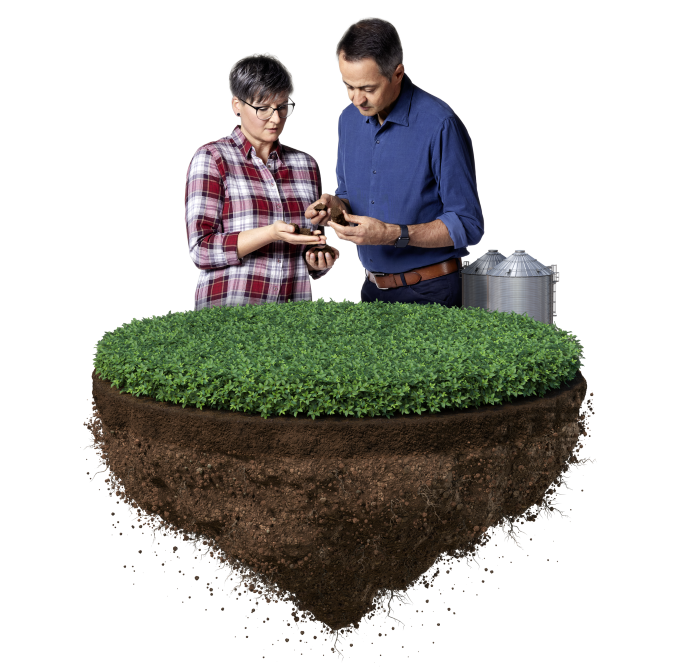Together for a healthy agriculture
Since the foundation of the company, it has always been of major importance to combine the development of agricultural machines for yield maintenance with environment protection, animal welfare and health.
A healthy soil is the basis for a sustainable agriculture. This is what our actions are aimed at. They are marked by our roots and inspired by Christian values. To cope with the challenges of a healthy agriculture, we provide technical and digital solutions for state-of-the-art farming, tillage, sowing and crop care.
Our cross-media campaign #FUTUREGROUND stands for the protection of the soil for the future and for future generations. The motifs of the campaign show people in dialogue on the “ground of the future“ - symbolised by floating earth islands.
Together with our customers, society and our employees etc. we develop ideas for an agriculture that is economically successful and contributes to a healthy climate on earth.
Prepare the soil for a healthy exchange
What if we are facing a shortage of food that is caused by the climate?
What if we are facing a shortage of food that is caused by the climate?
In the 2022 digital fireside chat Michael Horsch together with Josef Braun (organic farmer from Freising) and Deert Rieve (runs a conventional agricultural farm in Stralsund) discusses the climatic consequences on the production of staple foods. It basically is about the increasing influences of the climate on farming and agricultural production. Because of the crop failures caused by weather extremes the prices for rape, soya, maize but also for cereals have risen considerably. Canada for example was hit by a heat wave at the beginning of June, in China the flooding of the Yangtze led to considerable crop failures. According to statistics it was one of the biggest climate-induced damages as it mainly hit the “breadbaskets” of China. In addition, the prices are still influenced by Covid-19, the current commodity prices and the increased freight charges. However, there could be another reason for the situation in the market: namely the influence of a shortage of staple foods. Based on this assumption the discussion starts with the question if farming should completely be converted to organic farming or if there also are other problems and solutions.
According to Josef Braun organic farming at least is the correct approach if you take climate protection and wildlife conservation into account: “If we want to cope with these challenges, we have to rethink the use of the land.” In the future, too, land use has to meet the requirements of nature and man. The productivity of prime locations has to be maintained. Deert Rieve, too, agrees and adds: “We cannot afford a yield reduction on prime locations!”
In Braun’s opinion the “Agro-Forest” method also is a good approach. The principle of this method is to integrate trees and bushes in the fields. They, thus, lead to an improvement of the gross photosynthesis output, a reduced drawdown of the groundwater and they create better conditions for higher yields. But according to Rieve this has to happen without continuing to lose additional arable land. From an ecological and economic point of view it is important to maintain the prime locations. “We could reforest unproductive land where the negative consequences of a production caused by higher specific crop care measures are more serious”, Deert Rieve points out.
All three speakers agree that our eating habits, too, as well as the high amount of wasted food play a major role. According to statistics 1/3 of the food that is produced all over the world is wasted, 42% of it legumes, 22% cereals, 5% meat, 18% potatoes, but only 1% seafood (figures according to Michael Horsch). “You see, there is a causal relationship: the more expensive a product is the less often it is wasted“, Horsch says. In his opinion, the advantage of high prices also is that less food is wasted and that we start to think more about how we feed ourselves. So finally crooked fruits and vegetables have found their way into our supermarkets. “However, we must not forget the negative consequences for the Third World. These people often can only afford bread and if the bread price doubles because of the increasing wheat price, there really will be a big problem”, Horsch states. International trade, however, is able to compensate globally for crop failures. According to Rieve, countries that for different reasons – either climate or others – cannot produce themselves, can be supplied from other locations and compensate for shortfalls. He considers it a major responsibility to support each other and to find solutions together.
